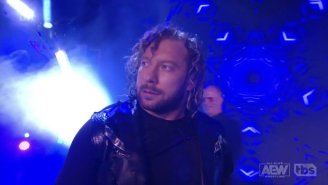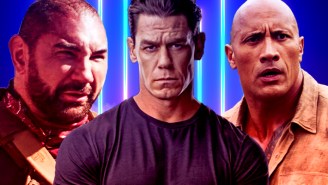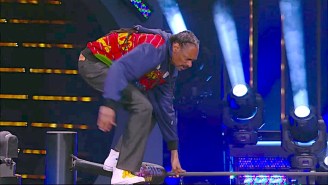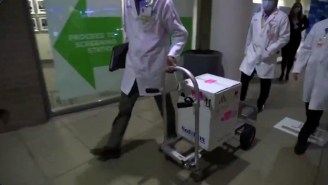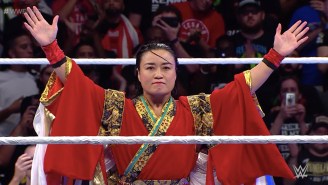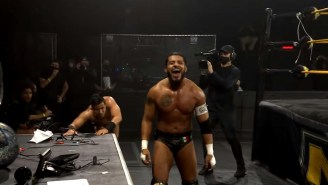If you’re a wrestling fan, you’re probably familiar with the concept of kayfabe — the sport’s carny roots of misdirection that lets good friends backstage act like bitter enemies in the squared circle. Two guys can tear each others throats out in front of an audience and then go backstage and share a beer — or tag team partners can hate each other after the bell rings and we all go home.
But one duo that tore through the 1960s territories took kayfabe to a whole new level, breaking boundaries both in and out of the ring.
For most of their time together, they were Ron and Paul Dupree, also known as Hell’s Angels No. 1 and No. 2. Clad in leather vests, swinging chains through the air, the pair of heels traversed the American wrestling landscape.
But the Duprees weren’t brothers. That shouldn’t surprise you much — neither were Kane and the Undertaker, really. What they were, though, was lovers.
Under the tutelage of promoter Tony Santos, who ran Big Time Wrestling in the Northeast, Russell Groves started working in 1960 as “Golden Boy” Ron Dupree, a flamboyant heel with bleached blonde hair. He soon partnered with a younger wrestler named Chuck Harris, who took on the name Paul Dupree. Their team was first called the “Golden Boys,” but Chuck’s time caddying for noted wrestling iconoclast Don Fargo inspired him to push the pairing in a new direction.
The duo changed their name to the California Hell’s Angels, cashing in on the swelling moral panic around the motorcycle club. They dressed in identical leather vests, grew their hair long and started swinging chains around on their way to the ring. The gimmick was an instant success.
It’s not really known when Harris and Groves began their romantic relationship, but it continued throughout their time as a tag team. Although they kept it secret from the fans, it was open in the locker room. Harris was a decade younger, so Groves was in many ways his mentor in the industry.
There were few other out wrestlers at the time. Terry Garvin was known to have a little black book of young men that he’d hook up with as he traveled the country with the NWA, and Pat Patterson has been public since the early 1970s. But the Duprees were different simply due to being in a committed partnership both in and out of the ring.
In 1968, they relocated to Arizona to get away from the cold Michigan winters. At first, they kept using the Hell’s Angels name until the motorcycle club forcefully objected. After a name change to the Comancheros, Ron and Paul Dupree riled local crowds up with masterful dickishness. Even hated local grapplers like Don Arnold and Woody Palmer turned face simply by dint of being across the ring from them. They were so outrageous that they once burned a flag on live television, causing their promotion to lose their broadcast license.
Their wildness wasn’t contained in the ring, either. One apocryphal story from their days together involved a wrestler sleeping off a match in his hotel room when a knock at the door revealed both Dupree boys with a baby white tiger on a leash that they’d obtained somewhere.
The duo left the Arizona territory in 1970 after a wild brawl with longtime rivals Pancho Pico and Ben Montez transformed into an all-out riot at the Phoenix Madison Square Garden. It was around that time that Ron suffered his first heart attack.
After that, he transitioned into less physical work, serving both as a manager and a ring announcer while Paul kept up the work in the squared circle. He was always the more gifted wrestler of the two, so it was a natural progression.
The only Hell’s Angels match online right now is a tag match from Big Time Wrestling, where the Angels face off against Arnold Skaaland and Jim Dillon (better known as ineffectual WCW authority figure J.J. Dillon). It’s a joy to watch. Even though their gimmick is rough, tough bikers, they complain to the ref about hair pulling before the match even starts and regroup with a hug on the outside when Skaaland makes the hot tag.
The most impressive move by either side is a bodyslam from one Hell’s Angel followed by a rough approximation of a top rope single foot stomp that gets them the pin on Dillon, but ot barely matters. The crowd is desperate to see the duo punished, and when the Duprees sneak out the win they bask in the waves of hatred from the audience.
It’s important to remember that the Hell’s Angels were working in the pre-HIV era, back when being gay was something that was discriminated against but not considered lethal. The amount of blood the two men spilled on the mat wouldn’t have been possible just a decade or two later when the “gay plague” started hitting the headlines. Openly gay wrestlers all but vanished during the 80s and 90s, driven back into the closet by their need to make a living.
Ron Dupree’s in-ring career was brought to an end in 1970, when he suffered his first heart attack. He didn’t want to leave the industry he loved, so he transitioned into work as a manager and ring announcer, working mostly in the Washington territory. Behind the scenes, Ron was a gifted tailor who created ring attire and entrance gear for many other wrestlers. He made a robe for Paul featuring the likeness of his musical idol Janis Joplin that he proudly wore to the ring.
On October 17, 1975, Ron was working as a ring announcer for a wrestling show in Tacoma, Washington. After he introduced the first match, between Ripper Collins against Paddy Ryan, he climbed out of the ring and collapsed on the floor. Medics were called in and Ron Dupree was pronounced dead on the scene of a heart attack. Every wrestler in the building agreed that the show should be canceled and every fan in attendance should be given a full refund.
Paul Dupree took the new ring name “Chris Colt” after one of the first gay porn magazines in the country. His solo career after Ron’s death was wild – he returned to the Phoenix Madison Square Garden for a cage match, only to climb into the ring high on peyote and start hallucinating spiders all over the structure. He panicked and started brawling with fans and security as he fled the arena. Colt’s contemporaries claimed he could never work sober, but promoters dealt with the hassle because he was unmatched at getting heat from the audience.
His face painted like an ersatz Alice Cooper, coming out to the strains of “Welcome To My Nightmare,” Colt sold everything like death, taking exaggerated bumps that made babyfaces look like a million bucks.
Johnny Valiant, who worked with Colt in the 80s, remembers him saying “Johnny, you can’t give me enough bumps. I can take these bumps all night.” No less an authority than Jim Cornette described him as “the best wrestler you ever saw that no one remembers today,” and that’s high praise.
Here’s a match against local boy Verne Seibert from Vancouver’s All Star Wrestling, where Colt is announced as “just in from Trinidad” and the announcers claim he was fired as a bodyguard for Joe Cocker.
Colt’s last go-round in the ring came in 1986 in Alabama’s Continental territory, where he worked heel (as always) as neo-Nazi “Chris Von Colt.” His body was beat down after two decades of bumping like a wildman, and he could barely move during his matches. But he still got that heat.
After leaving the wrestling business, Chris Colt made a few gay porn movies with titles like “Sex Aggression: Jack Husky’s First Night At Chris Colt’s Wrestling Academy” before disappearing from the public eye. Rumor has it he became a born-again Christian before dying of AIDS in a Seattle homeless shelter in the 1990s.
The story of the Dupree brothers is a great illustration of the incredible stories that were happening in the territories all over the country before the McMahon family consolidated the business. The fact that a pair of openly gay men were accepted in the locker room despite their personal issues shows the closeness that the business built in those days. When a WWE worker like Darren Young came out of the closet, it was a national news story for the company. But the wrestlers who worked with the Duprees just accepted it as part of the personal lives of a pair of talented, complex men.

